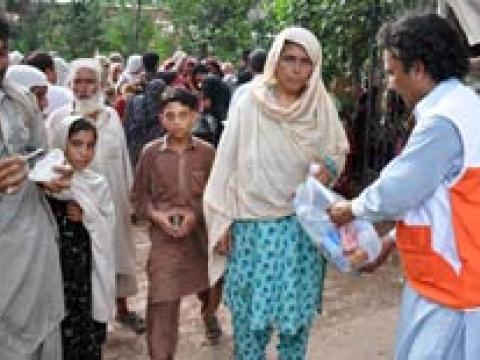Devastated family laments losses but is thankful for aid

Only days ago, Nasreen, her husband Rasi and their three children lived in a mud house near the river in the Nowshera district of Khyber Pakhtoonkhwa Province (formerly known as the North West Frontier Province). Rasi worked as a labourer, and the family owned two cows. Then monsoon rains of epic proportions started to fall and the river began flooding. At 6 a.m. one morning as the water rose, Nasreen and her family decided to make a dash for the tallest building in their neighbourhood: the local mosque and school. For three days they crammed together on the rooftop of the school with more than 100 people from houses close to the river, exposed to the elements and waiting to be rescued, or at least for something to eat. After three days on the roof, a Pakistani military helicopter dropped food supplies. Later that day, a helicopter began airlifting people to higher ground, out of the reach of the swirling torrent of mud and water. Though safer, the conditions at the camp where they have taken refuge are hardly ideal. Nasreen and her children share a classroom at the Pabbi Government High School with about 50 people. Severe overcrowding contributes to the stifling, suffocating heat and stench in each of its rooms. On Thursday, they were provided at least some relief. World Vision began an emergency food distribution in the area, giving out food parcels containing milk, bread, snacks, biscuits and water to 1,000 families at that school and others nearby – including Nasreen and her family. The parcels are benefiting around 7,000 people. “We have been living on the charity of the locals and the surrounding villages for now,” said Nasreen. “You are the first people who have approached us, and you’ve given us the food and water with dignity.” The water has receded from Mohib Banda now, but the mud and debris strewn across the land is like quicksand. Many of the homes – also constructed out of mud – have been washed away. For those families, like Nasreen’s, it won’t be a matter of cleaning up, but of rebuilding. They haven’t yet figured out how to replace the cows and recover their livelihood. “I don’t know what we will do now,” said Nasreen. “We were poor already and lost whatever we had in the floods; our only shelter and means of income. Where do we go from here? We have nowhere to go.” In the coming days World Vision plans to scale up its distributions to reach more families and distribute food parcels (including wheat flour, sugar, tea, cooking oil, salt, rice, lentils and dates), cooking sets, hygiene kits and shelter kits.